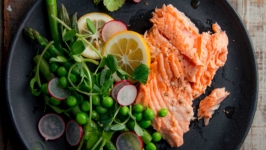The Future of Food
By Gibson Thomas, in discussion with Jennifer Bushman and Nicolette Hahn Niman
IS VEGANISM THE ONLY WAY FORWARD? —MYTH-BUSTING WITH EXPERTS ON LAND AND SEA
The celebrity-and media-hyped release of a 2021 documentary film about the purported environmental impact of fishing had many of us, again, pondering the question “Is veganism the only way to feed the world’s exploding population without destroying the planet?” The film’s producer had also produced a similarly sensational 2014 documentary about the impact on the environment from raising animals for meat. The veganism “solution” had been touted by some in the wake of that film’s release, as well.
As a dedicated omnivore, who also wants everyone in the world to have access to good food—meaning culturally appropriate, as they prefer, not dictated by outsiders, and certainly not by those of us living in first-world, wealthy nations—clean, produced using ethical practices, by people paid a fair living wage, from animals treated humanely, using methods that regenerate the land on which it is grown and harvested, and causing no harm to the environment, this question is more than just rhetorical. I really want to know.
This is my world, and as I travel throughout our region, I see Loren Poncia raising cattle on gorgeous green pastures at Stemple Creek Ranch, the soil health growing more vibrant every day actually because he is ranching it, and I know the care he takes when it is time to harvest the animals. I see Hog Island Oyster Company practicing sustainable aquaculture that acts as a filter in our bays. I see fisherfolk leaving the harbor in Sausalito and Bodega Bay, hooks and lines their only tools. I see Point Reyes Farmstead Creamery, Cowgirl Creamery, Tomales Farmstead Creamery and many more artisan producers working with milk produced by animals treated with the utmost care, and in ways that care for the land. But is this small-scale food production scalable to feed the world’s population? Not entirely, certainly.
I also have cherished friends who are happy, thriving vegans, choosing this way of eating for an array of reasons. It works for them.
So…
One of the many “perks” of publishing this magazine is being in community with so many experts in their field, and none more so than fellow Marin residents Jennifer Bushman and Nicolette Hahn Niman, each a passionate advocate for food being raised in ways that “feed the people,” as well as respecting the planet, in their respective areas of expertise. I gratefully turned to them to help me make sense of these literally life-altering questions.
Spoiler alert: After reading Jennifer and Nicolette’s thoughtful and well-researched responses to the “Top 5 Myths” about eating seafood and meat, respectively, and delving into the primary sources they cite for more explanation, I find myself even more deeply rooted in the “diet” prescribed by author Michael Pollan: Eat food. Not too much. Mostly plants. And ever more grateful to live in an area where I can be sure that the meat and seafood I choose to eat are being raised and harvested with respect for the planet, as well as our tables.







